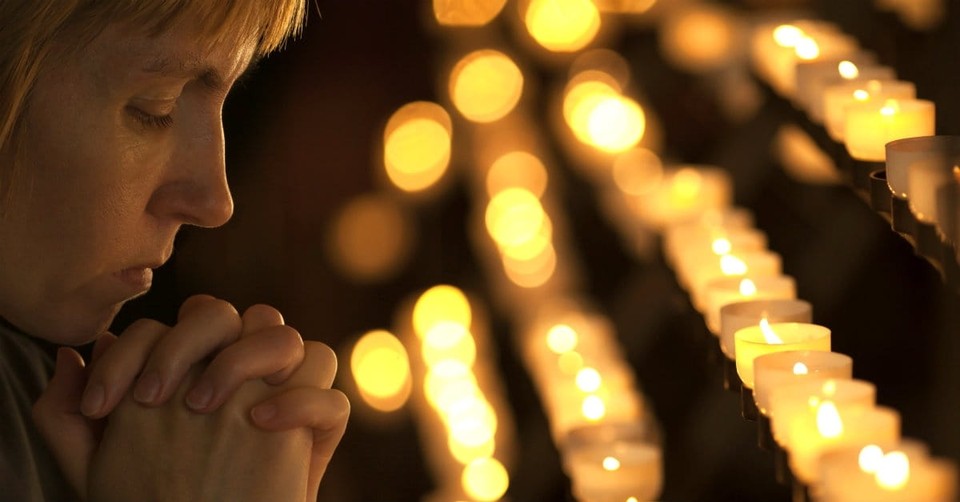Worship the Way God Intends

Editor's Note: The following is a report on the practical applications of Nelson Searcy, Jason Hatley, & Jennifer Dykes Henson's book, Revolve: A New Way to See Worship, (Baker Books, 2011).
If the time you spend in worship each weekend at church seems like it’s missing something, you may not be worshiping the way God wants you to worship. No, that doesn’t mean that God prescribes just one form of prayer that you’re not using, or a certain style of music that you’re not singing. When your worship seems incomplete, your entire approach to worship may be off.
True worship – which is always fulfilling – revolves around God, not your own expectations. Feeling disappointed by your worship experiences is a signal that you need to learn how to approach worship from the perspective God wants you to have, so you can worship the way God intends:
Debunk the myth that worship is all about you. Worship is all about God, not you. So instead of asking what you can get out of worship personally, ask what you can give to God through worship. Rather than being concerned about whether or not worship meets your expectations (from exciting music to warm feelings), focus on how you can bring honor and glory to God as you worship. If you approach worship by asking God what He has for you in your worship experience, you may not be satisfied. But if you approach worship looking for opportunities to encounter God and praise Him, you’ll be fulfilled in the process.
Debunk the myth that happens just one day a week. Worship isn’t just an event that you attend, like a concert. God intends for worship to be a lifestyle, in which you consistently connect with Him. Beyond your church’s weekly worship service, you can keep worshiping God – at all times, and in all situations. Stop thinking of worship as just an event that you passively attend, and start thinking of worship as an ongoing process in which you actively pursue a closer relationship with God and express your love for Him. When you’re not at church, use spiritual disciplines (such as prayer and Bible reading, meditation, and study) to help you worship God. Also, use your relationships with other people to worship God by sharing your faith with them and serving them in the ways God leads you to reach out to help meet their needs. As you go through the mundane moments of each day, pray for the discernment you need to notice God’s presence with you and the many blessings He has given you. Then thank God and praise Him whenever you have an opportunity to do so. In that way, you can worship throughout each day. When you’re facing challenging or difficult circumstances, you can worship God by praying brief prayers asking for God’s help and expressing your trust in His care for you. Any time you put your faith in action to express your love for God, you’re worshiping Him.
Debunk the myth that worship is just a part of your life. Worship shouldn’t be just one part of your life; it’s meant to permeate all of your life. God hopes that, when you worship, you’ll offer your entire life to Him and seek to find and do His will for every decision you make. The only way to find real, lasting peace and fulfill your potential as a person is to infuse worship into every part of your life (not just the part of your life that involves going to church). Since God has designed all human beings to worship, you’re bound to worship something, whether or not it’s God. You naturally worship whatever you place at the center of your life (which you can tell by how much energy, time, and money you spend pursuing it). People can worship their careers, marriage, children, the pursuit of money or pleasure, or anything or anyone else that they devote themselves to more than they devote themselves to God. You also become more like whatever you choose to worship, as a natural result of the worship process. So if you revolve your life around pursuing money, you’ll become a materialistic person. But if you revolve your life around God, you’ll become more spiritually mature. So aim for the goal of true worship: to put God in His rightful position as the focal point of your life. Fall in love with God and devote yourself completely to Him, revolving everything else in your life around your relationship with God.
Debunk the myth that worship is a religious activity. Worship is really about a relationship, not a religion. If you worship God out of a sense of religious duty, trying to earn favor with Him by performing religious rituals, you’ll eventually fail to meet the standards you’re trying to reach and be crushed by shame, guilt, and the pressure of feeling obligated to do what you lack the power to do on your own. But if you approach worship as a way to strengthen your relationship with God, you’ll connect with Him in ways that will empower you to become the person He wants you to become, and you’ll feel loved and free rather than guilty and pressured. When you have a right relationship with God, you’ll be motivated to do what’s right out of love, not out of obligation. Enjoying a close relationship with God will inspire you to do what He calls you to do because you want to, not because you have to do so – and your loving, faithful response to God means that you’re truly worshipping Him.
Bring something of value to your worship. It pleases God when you offer Him something of value as part of worshipping Him. Bring God the gift of yourself by spending time with Him simply to get to know Him better and develop a closer bond with Him. Offer God your talents and skills by using them to serve others through the ways in which God leads you. Entrust your family and friends to God by sharing your faith with them, praying for them, and inviting them to church with you. When you bring something valuable to God, you’re worshipping Him by honoring Him.
Adapted from Revolve: A New Way to See Worship, copyright 2011 by Nelson Searcy and Jason Hatley, with Jennifer Dykes Henson. Published by Baker Books, a division of Baker Publishing Group, Grand Rapids, Mich., www.bakerpublishinggroup.com.
Nelson Searcy served as the director of The Purpose Driven Community at Saddleback Church before starting The Journey Church of the City in New York City in 2002. He and his 2,000-member church appear routinely on lists such as The 50 Most Influential Churches and The 25 Most Innovative Leaders. The Journey is a multi-site church with locations across New York City (https://www.journeymetro.com/) and Boca Raton, Florida (https://bocajourney.com/). His newsletter for pastors and church leaders, Church Leader Insights, now reaches more than 80,000 subscribers and continues to grow by hundreds each month. Searcy lives in New York City.
Jason Hatley is the pastor of worship arts at The Journey Church and has been a worship leader since 1996. Founder of www.WorshipLeaderInsights.com, Jason has spoken at the Willow Creek Arts Conference and The Purpose Driven Worship Conference, as well as seminars around the country. Currently, Jason serves at The Journey's newest location in Boca Raton, Florida.
Jennifer Dykes Henson is a freelance writer based in New York City. She has served as a writer/producer and ministry consultant to organizations across the East Coast. Jennifer also worked with Dr. Charles Stanley as the manager of marketing communications for In Touch Ministries in Atlanta, Georgia.
Whitney Hopler is a freelance writer and editor who serves as both a Crosswalk.com contributing writer and the editor of About.com’s site on angels and miracles (https://angels.about.com/). Contact Whitney at: angels.guide@about.comto send in a true story of an angelic encounter or a miraculous experience like an answered prayer.
Originally published December 30, 2011.







